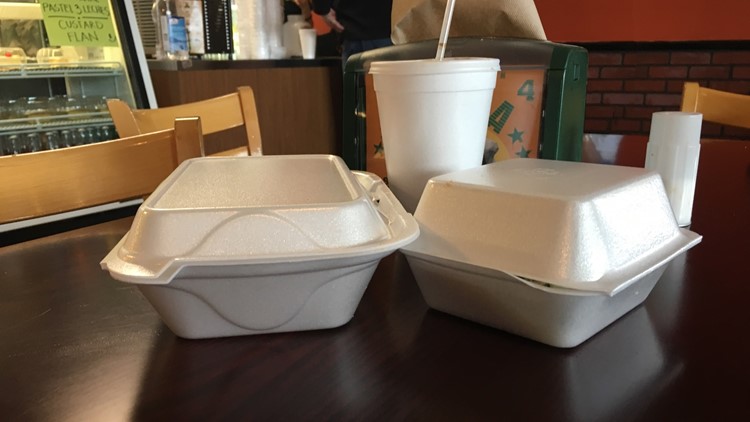MINNEAPOLIS, Minn. -- A bill moving quickly through the Minnesota House would bar cities from enacting bans on polystyrene takeout containers, and retroactively nullify ordinances already on the books in Minneapolis and St. Louis Park.
Rep. Drew Christensen, a Republican from Savage, said his legislation is in response to cost concerns raised by restaurant owners. It passed the Local Government and Elections Committee this week, and is headed for a vote by the full House after the Easter-Passover break.
"Who I’m really worried about is the small businesses that are struggling to get by," Rep. Christensen told KARE.
"The big businesses, frankly, can absorb or pass down to consumers some of these price increases, but with the small businesses it’s tough for them make it work."
Minneapolis and St. Louis Park are the first two cities in Minnesota to require restaurants to use cups and boxes that are recyclable or compostable for to-go orders.
"The purpose of our ordinance was to increase recycling and composting in the city, by reducing the amount of material that has to go into the trash," Emily Barker, the solid waste coordinator for St. Louis Park, told KARE.
Barker, who testified against the bill, said that compostable container prices are falling as more restaurants switch to them.
"Compostables have really come down in cost over the last several years. It’s largely an economy-of-scale thing, as the more demand comes up, the cost comes down."
She said polystyrene is much harder to recycle, because of the logistics of handling products that are 70 percent air. Even clear polystyrene containers, marked with a triangular resin ID code of 6, aren't accepted by St. Louis Park's recycling system because there's not much of market for them.
But Dave Cossetta, the owner of Cossetta Alimentari in St. Paul, spoke in favor of Christensen's bill. Cossetta also battled efforts by the St. Paul City Council to enact a similar takeout container ordinance.
"The main point I want to get across is about fairness," Cossetta told KARE. "It's not fair that restaurants have to do this but grocery stores are exempted for their packaged food."
Cossetta came to the hearing armed with props -- containers from Target and various grocery store made of materials not considered compostable or recyclable. He's worried that the idea may resurface in St. Paul.
There's precedent for what Chistensen is trying to do. In 2017 the legislature passed a bill that knocked out a ban on plastic grocery bags in Minneapolis. Lawmakers also attempted to preempt cities from setting their own wage and sick leave policies, but that was vetoed by Gov. Mark Dayton.
In the meantime, St. Louis Park continues public awareness efforts to help consumers understand how compostables and recyclables are marked and labeled.
"The typical coffee cup or soda cup you get is mostly paper, but the inside is lined with plastic, and that plastic can’t be composted," Barker explained. "It becomes a contaminant in the composted material."
Compostable cups may look the same from the distance, but are lined with plant-based material. Fortunately, those cups normally bear the Biodegradable Products Institute, or BPI, logo.
Rep. Christensen said there's nothing in his bill that would keep restaurants from voluntarily moving away from polystyrene.
"I think that’s important we’re letting businesses work with their customers to determine kind of what's the path is for them, and that we’re not forcing people out of business with heavy-handed regulations."



